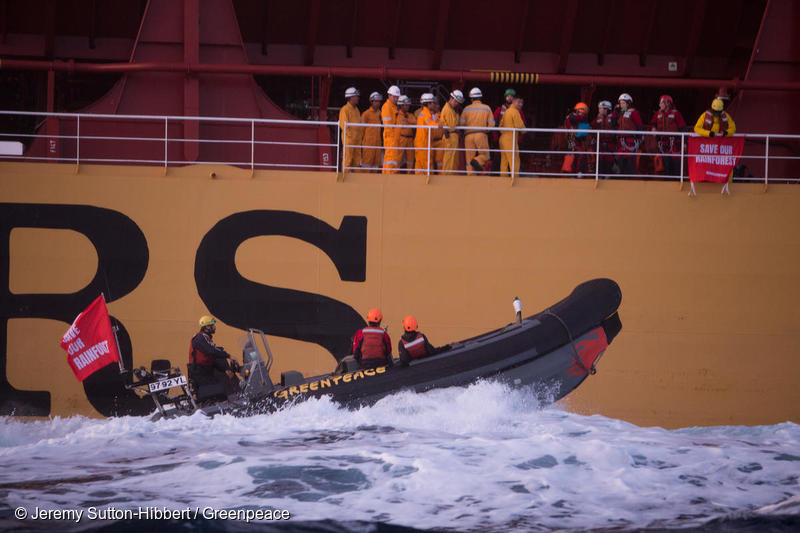Photos and video:
https://media.greenpeace.org/collection/27MZIFJW7KI8R

Crew members of the Stolt Tenacity tanker ship confront six Greenpeace volunteers who boarded the giant tanker ship carrying dirty palm oil from Indonesia to Europe in a peaceful protest against rainforest destruction.
17 November 2018 (AMSTERDAM) — Six Greenpeace activists, including one Canadian, have been arrested by the captain of a giant tanker while peacefully boarding a 185-metre long cargo ship loaded with palm oil products from Wilmar International, the largest and dirtiest palm oil trader in the world and a supplier to the maker of Oreo cookies. [1]
The Stolt Tenacity, carrying dirty palm oil from Indonesia to Europe, was safely scaled by Greenpeace International volunteers from Canada, Indonesia, Germany, the UK, France, and the US in a peaceful protest against rainforest destruction in Indonesia. Among them is Victoria Henry, a Canadian woman from Burnaby, B.C. (and now U.K. resident).
The boarding happened near Spain in the Gulf of Cadiz. Before being detained they unfurled banners reading “Save our Rainforest” and “Drop Dirty Palm Oil”. The captain has been informed via VHF radio of the peaceful and non-violent nature of the protest. However, he has detained the climbers in one of the cargo ship’s cabins.
“We have limited radio contact with our volunteers and have called on the ship’s captain to free them so they can continue to peacefully protest against companies like Wilmar that are shipping dirty palm oil from forests destroyers into our supermarkets and homes”, said Hannah Martin, campaigner on board the Greenpeace ship Esperanza.
Wilmar is a major supplier to global snack food giant Mondelez, one of the world’s largest buyers of palm oil, which it uses in many of its best-known products, including Oreo cookies such as those sold in Canada (which has been one of Oreo’s biggest market). [2] An investigation released earlier this week by Greenpeace International found that Mondelez’s palm oil suppliers have destroyed 70,000 hectares of rainforest across Southeast Asia in two years and showed evidence of child labour, exploitation of workers, illegal clearance, forest fires, and land grabbing. [3]
“I’m from Indonesia. I’ve witnessed the devastating impact of deforestation for palm oil and our cities choking with haze as a result of the forest fires. I’m here to send a message to Mondelez that Wilmar’s dirty palm oil is destroying our home and we don’t want it in our supermarkets”, said Waya Maweru, a climber from Sulawesi, Indonesia.
“Palm oil can be produced without trashing our forests. Over one million people around the world are demanding action. Now it’s time for Mondelez, the makers of Oreo cookies, and other brands to listen to their call and cut Wilmar off until it can prove its palm oil is clean”, said Kiki Taufik, Greenpeace spokesperson on board Greenpeace ship Esperanza.
Greenpeace is calling on Mondelez to drop Wilmar until it proves its palm oil comes from producers that are not destroying rainforests or exploiting people.
Tropical deforestation produces more greenhouse gas emissions each year than the entire European Union, outranking every country except the USA and China. In October 2018, the Intergovernmental Panel on Climate Change called for an immediate end to deforestation to limit global temperature rises to 1.5°C.
-30-
Photo and video will be constantly updated HERE.
NOTES
[1] The cargo ship Stolt Tenacity is carrying palm oil products from one or both of the Wilmar refineries in Dumai, on the Indonesian island of Sumatra. Wilmar has two refineries near Dumai – one in Pelingtung and one in Dumai itself. Both are called PT Wilmar Nabati Indonesia.
According to Wilmar, these refineries are supplied with palm oil from rainforest destroyers, including Bumitama, Djarum, the Fangiono family and Gama. In September 2018, Greenpeace International published an investigation into 25 of the most destructive palm oil producer groups in Southeast Asia. Wilmar confirmed that it was sourcing from 18 of them. It subsequently stopped sourcing from some of these groups.
According to Wilmar’s most recent supply chain data, which cover the period July 2017 – July 2018, at least six of these producer groups supplied its Dumai refineries, including Anglo-Eastern, Bumitama, Djarum, the Fangiono family, Gama and Trurich (a Felda-LTH joint venture).
PT Wilmar Nabati Indonesia – Pelintung: http://www.wilmar-international.com/sustainability/wp-content/uploads/2018/10/181026_WINA-PLT_L2.pdf.
PT Wilmar Nabati Indonesia – Dumai: http://www.wilmar-international.com/sustainability/wp-content/uploads/2018/10/181026_WINA-DMI_L2.pdf.
Other Wilmar facilities supply one or both of the two refineries, including Wilmar’s Multi Nabati Sulawesi refinery, which Greenpeace occupied in September.
[2] In 2017, Mondelez used 306,554 tonnes of palm oil and derivatives, and in 2016, Mondelez used 312,266 tonnes of palm oil. Based on analysis of ingredients lists. Manufacturing variations mean that palm, canola, or soybean oil may be being used in different regions or factories. “Modified palm oil” is listed as an ingredient in Oreo products sold in Canada; it is unclear whether the palm oil used for Oreo production in Canada is sourced from suppliers responsible for deforestation. See this 2017 Oreo Factsheet for biggest markets.
[3] Due to the nature of the palm oil trade (and action by the company), some of the 22 dirty producers may not currently be supplying Mondelez with palm oil, although they were all suppliers between 2015 and 2017, when the forest destruction took place.
Contacts
Sol Gosetti, International Communications Coordinator, Indonesia Forest campaign, Greenpeace Southeast Asia [email protected], +44 (0) 7380845754
Greenpeace International Press Desk, +31 (0)20 718 2470 (available 24 hours), [email protected]
